|
|
|
Sort Order |
|
|
|
Items / Page
|
|
|
|
|
|
|
| Srl | Item |
| 1 |
ID:
123490


|
|
|
|
|
| Publication |
2013.
|
| Summary/Abstract |
Between 1932 and 1945 the Japanese military raised a number of 'puppet' armies. While research has focused on the motives of those who opted to collaborate with the Japanese during the period, little work has been done regarding the composition of these forces. The article examines the Kwantung Army's January 1936 plans for an Inner Mongolian Army, and the reasons why this 'army' never eventuated in the form that had been planned. This sheds light on how officers of the Kwantung Army understood, and misunderstood, the potential of peoples of North China to become useful collaborators in wresting the region from the Nationalist Chinese control.
|
|
|
|
|
|
|
|
|
|
|
|
|
|
|
|
| 2 |
ID:
168783


|
|
|
|
|
| Summary/Abstract |
This article uses the case of the London Missionary Society (LMS) in China to argue that disruptive cultural technologies—namely organizational forms and tools—were just as significant within Christian mission encounters as religious doctrines or material technologies. LMS missionaries did not convert as many Chinese to Christianity as they hoped, but their auxiliary efforts were more successful. The LMS mission project facilitated the transfer of certain cultural technologies such as church councils to administer local congregations or phonetic scripts to facilitate literacy. Once in the hands of native Christians and non-Christians alike, these cultural technologies could be freely adapted for a variety of purposes and ends that often diverged from the missionaries’ original intent and expectation. This article draws on the letters and reports of missionaries of the London Missionary Society in North China from roughly 1900 to 1930—the period during which self-governing Protestant congregations took root in China and many places around the world. The spread of church government structures and a culture of Bible-reading enabled Chinese within the mission sphere to create new forms of collective life. These new forms of community not only tied into local networks, but also connected to transnational flows of information, finances, and personnel. Native Christian communities embraced new, alternative sources of community authority—the power of God working through a group of ordinary people or through the biblical text—that proved both attractive and disruptive.
|
|
|
|
|
|
|
|
|
|
|
|
|
|
|
|
| 3 |
ID:
100876
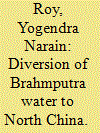

|
|
|
| 4 |
ID:
130433
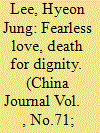

|
|
|
|
|
| Publication |
2014.
|
| Summary/Abstract |
While the high rates of female suicide in rural China have attracted much scholarly attention, previous studies have not addressed the psychological processes by which individual women in rural areas decide to attempt suicide. Based on ethnographic research in Hebei villages, this article examines different types of gendered subjectivity that lead some rural women to make fatal decisions. Suicidal behavior is an important form of female agency that asserts rural women's moral aspiration for freedom and individual rights, but this form of agency does not highlight their ability to resist. Rather, it points to their powerless positions in the community. From these findings, I argue that neither the concept of resistance nor that of subjection can properly represent the complex realities and inner voices of rural women who attempt suicide.
|
|
|
|
|
|
|
|
|
|
|
|
|
|
|
|
| 5 |
ID:
079929
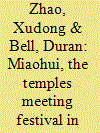

|
|
|
|
|
| Publication |
2007.
|
| Summary/Abstract |
We examine the multiple purposes and modalities that converge during a circuit of festivals, miaohui, which temples organize in recognition of local gods and which are attended reciprocally by temple representatives from the surrounding area in North China. The festivals involve intense expressions of devotion to one or more deities, while offering an opportunity for representatives of other villages to seek recognition through rather boisterous drumming and prolonged choreographed dancing. We note also the emergence of Mao as a great god whose legacy as Chairman of the CCP is projected in order to legitimate current Party leadership and their policy of reform while concurrently acting as a powerful denial of those same policies from the perspective of villagers.
|
|
|
|
|
|
|
|
|
|
|
|
|
|
|
|
| 6 |
ID:
111298
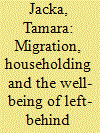

|
|
|
| 7 |
ID:
144570


|
|
|
|
|
| Summary/Abstract |
Today, with social protests a daily phenomenon in China, the Party-state’s survival hinges upon its institutional capacity to prevent, monitor, process information on, and overcome real and potential challenges. Over the past decade, the Communist Party has consistently stressed the critical importance of ‘stability preservation’ (weiwen) as central to ensuring the longevity of the authoritarian regime. Drawing upon intensive interviews and archival research, this article looks into the stability-preservation system in W County in North China. By exploring the institutional configuration, work mechanisms, daily activities and operational principles of the stability-preservation apparatus in the county, the author seeks to gain insight into the PRC regime’s mythical operations of ‘system maintenance’ and the ways in which the Party-state exerts control over society.
|
|
|
|
|
|
|
|
|
|
|
|
|
|
|
|
| 8 |
ID:
117724
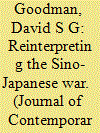

|
|
|
|
|
| Publication |
2013.
|
| Summary/Abstract |
The War of Resistance to Japan (1937-1945) has long been recognised as the most important stage in the Chinese Communist Party's rise to power in 1949. Particularly in its North China base areas, the Chinese Communist Party is said to have pursued moderate, inclusive, and mobilisatory tactics during the war years to build a movement for national salvation from the bottom up, which eventually led to the establishment of the People's Republic of China. The evidence from the heart of the Taihang Base Area suggests the possibility of another contrasting history, masked by current interpretations, in which 1939-1940 was a crucial turning point in that process. Starting in September 1939, and for the following six months, there is evidence of more explicitly revolutionary endeavour. The Chinese Communist Party seized power locally from its allies and destroyed the opposition; it engaged in violent land reform and wealth redistribution; and it attempted to proletarianise itself. Understanding the causes of these phenomena and their consequences in one of the most important front-line base areas provides new perspectives on both the course of the war with Japan and the Chinese Communist Party's eventual success.
|
|
|
|
|
|
|
|
|
|
|
|
|
|
|
|
| 9 |
ID:
151576


|
|
|
|
|
| Summary/Abstract |
This paper explores the role of guanxi, particularly in its special form of tunqin, in building rural resilience in a poverty-stricken county in north China. The emphasis of this paper is placed on the nature and function of such guanxi. By presenting how guanxi is maintained, this paper also analyses the impact and effectiveness of local guanxi as a strategy to cope with poverty. Whereas tunqin guanxi appears to have built rural resilience in order to cushion villagers against life's upheavals, the maintenance of rural guanxi diminishes this resilience as scarce resources are spent on the exchange of cash gifts, thus aggravating local poverty.
|
|
|
|
|
|
|
|
|
|
|
|
|
|
|
|
| 10 |
ID:
150460


|
|
|
| 11 |
ID:
092689


|
|
|
|
|
|
|
|